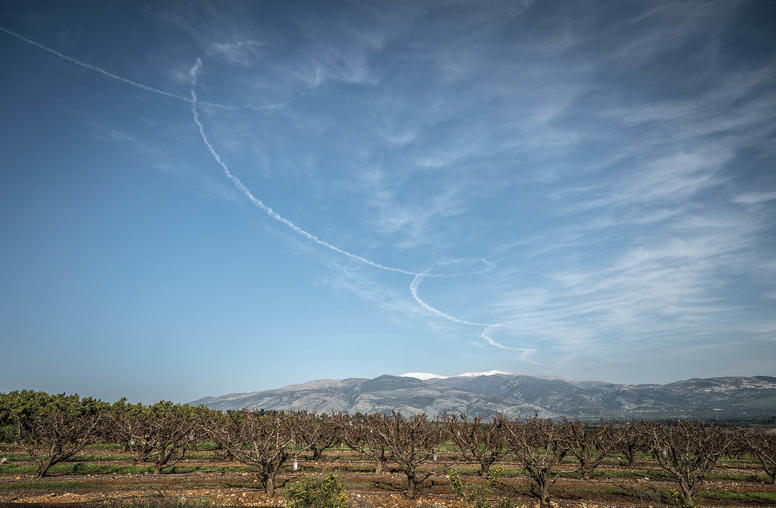In Syria, Avoid ‘Sudden Collapse’ of Assad Regime, Opposition Leader Says
Khaled Khoja Speaks at USIP as UN Restarts Peace Effort
As the United Nations begins a third attempt in as many years to guide a peace process in Syria’s civil war, the new head of the country’s Western-backed opposition coalition says Syrians should work to avoid any “sudden collapse of the regime in Damascus.” While the government of President Bashar al-Assad appears to be weakening, “the only power that can force the regime to negotiate is Iran,” said the Syrian National Coalition’s president, Khaled Khoja.

Khoja met Syria specialists from the U.S. Institute of Peace and other organizations at USIP May 5 amid a visit to Washington to seek greater U.S. support in the four-year-old war. The conflict has killed more than 200,000 people, according to the London-based Syrian Observatory for Human Rights. Khoja said opposition forces, fighting to topple the nearly 45-year-old Syrian regime headed by Assad and previously by his father, have doubled the territory they control in Syria during the past two months.
In increasing military pressure on Assad, “the important thing is to prevent the sudden collapse of Damascus,” Khoja said. “If it collapses, we will have a Somalia scenario.” He has said that a transition to a new government should aim to remove Assad and his repressive security establishment, while preserving Syria’s state institutions.
Assad, whose ruling elite is based largely on the minority Alawite sect of Shia Islam, has seen increasing defections from its forces, notably by Sunni Muslim troops, and is increasingly dependent on Iranians and other foreign Shias to fill out its forces, Khoja said. Still, Assad’s regime is using air attacks, largely by helicopter, to “create chaos” in opposition-controlled zones, he said.
“A lack of U.S. leadership is creating more chaos,” he added. Khoja, who met Secretary of State John Kerry on April 30, repeated his call for the United States to protect coalition-allied forces from Syrian air attacks. In recent months, several U.S. scholars and policy specialists on Syria, including USIP Vice President Steve Heydemann, have urged the U.S. government to establish a no-fly zone over northern Syria and accelerate programs to train and equip opposition fighters.
A May 5 report by Amnesty International condemned the Assad regime for its hundreds of attacks in which aircraft drop “barrel bombs”—oil barrels or other containers packed with explosives and shrapnel—on opposition-held areas such as the city of Aleppo. Such attacks have killed more than 11,000 civilians in Syria since 2012 and constitute war crimes, Amnesty said. Assad has denied in interviews that his forces have ever used such bombs.
Khoja is continuing an extended campaign by the coalition to persuade the Obama administration that it represents a broad political center in Syria that merits greater U.S. aid in fighting both the Assad regime and two prominent militant Islamist groups: Jabhat al-Nusra, which is allied to al-Qaida, and the Islamic State of Iraq and the Levant (ISIL, also known as ISIS), which also has its roots in al-Qaida in Iraq.
Fifth President of the Coalition
Khoja, a medical doctor from Damascus, was elected in January as the fifth president of the coalition, a two-year-old, Western-backed assembly that includes representatives of more than two dozen political factions or local councils, plus prominent business leaders, political dissidents and other prominent Syrians. The assembly, formally titled the National Coalition of Syrian Revolutionary and Opposition Forces, has declared plans to form an interim government. It commands no military forces in Syria, but includes representatives of the Free Syrian Army, formed mainly by Sunni Muslim defectors from Assad’s military.
The United Nations envoy for Syria, Staffan De Mistura, began meetings in Geneva May 5 with what he told journalists would be "a broad spectrum of [Syrian] youth, political and military actors, women, victims, civil society, diaspora, religious and community leaders,” among others.
Khoja, who met De Mistura last week, told listeners at USIP that his coalition is holding talks with several Islamist rebel groups to seek a consensus on Syria’s future. Islamist groups, including Jaish al-Islam, have dismissed the coalition as an organ dominated by Syrians in exile and unrepresentative of those in Syria fighting against Assad. Khoja said the Assad regime is vulnerable to forces of Jaish al-Islam, which is based in Ghouta, an eastern suburb in an agricultural belt outside Damascus, where an August 2013 chemical attack prompted the U.S. to consider military action against Assad’s forces. The U.S. relented when the regime agreed to give up its chemical weapons. Khoja said he met in Istanbul with the Jaish al-Islam leader, Zahran Alloush, before coming to Washington.
The UN consultations and the consensus-building efforts by the Syrian National Coalition exclude the most hardline Islamist groups, al-Nusra and ISIS, which control much of northern Syria and the Euphrates River valley.
Khoja underscored the links among the wars in Syria, Iraq and Yemen, where Saudi Arabia supports largely Sunni factions against Shia Muslim groups backed by Iran. With the active Saudi intervention against Shia rebels in Yemen, Assad sees his own position weakening, and now is focused on “protecting the Damascus city center and the coastal area” to the capital’s northwest, Khoja said.



